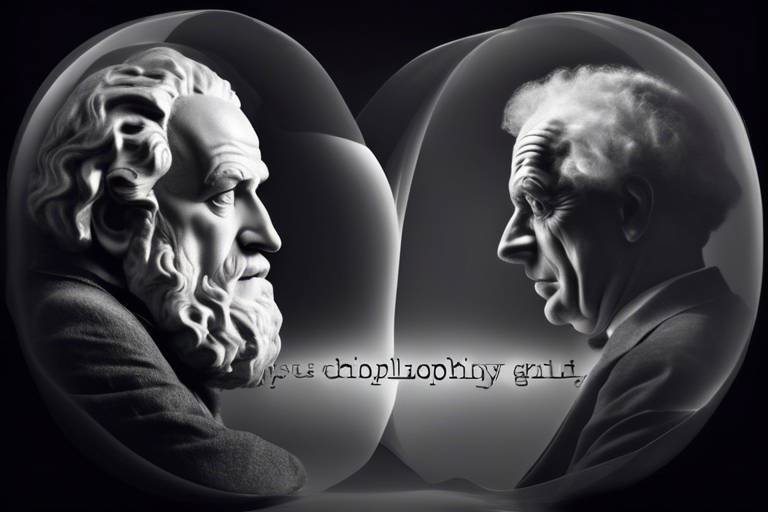The Concept of Self - A Philosophical Analysis
The concept of the self is a deeply intricate and multifaceted topic that has fascinated philosophers, psychologists, and thinkers for centuries. At its core, the self encompasses our identity, consciousness, and existence, posing fundamental questions about who we are and how we perceive ourselves in relation to the world around us. This article aims to unravel the layers of the self by exploring various philosophical perspectives, providing insights that not only challenge our assumptions but also invite us to reflect on our own identities.
From the ancient Greeks to contemporary thinkers, the discourse surrounding the self has evolved dramatically. Philosophers have grappled with questions like: Is the self a stable entity, or is it subject to change? Can we truly know ourselves, or are we constantly shaped by external influences? These inquiries are not merely academic; they resonate deeply with our everyday experiences, influencing how we navigate our relationships, make choices, and confront the complexities of life.
As we delve into the historical perspectives on the self, we will encounter a rich tapestry of ideas, each contributing to a broader understanding of what it means to be human. We will explore the tension between dualism and monism, examining how these opposing views shape our understanding of consciousness and identity. Philosophers like René Descartes, who famously declared "Cogito, ergo sum" (I think, therefore I am), invite us to consider the significance of thought in defining our existence. In contrast, Eastern philosophies challenge Western notions of a fixed self, emphasizing concepts such as impermanence and non-self.
Through this philosophical journey, we will also look at modern discussions about the self, particularly how contemporary issues—such as social media, technology, and cultural narratives—impact our self-perception. The exploration of existentialism and postmodernism will reveal how the quest for authenticity and the fragmented nature of identity are more relevant than ever in today's fast-paced world.
Ultimately, the analysis of the self is not just an intellectual exercise; it is a personal quest. Understanding the self can lead to greater self-awareness, allowing us to navigate our lives with intention and authenticity. So, as we embark on this exploration, let's keep an open mind and consider how these philosophical ideas can illuminate our own paths to self-discovery.
- What is the self in philosophical terms? The self refers to the essence of a person, encompassing identity, consciousness, and personal experience.
- How do different cultures view the self? Western philosophies often emphasize individualism, while Eastern traditions may focus on interconnectedness and the concept of non-self.
- What is the significance of dualism and monism? Dualism posits a separation between mind and body, while monism argues for their unity, impacting our understanding of consciousness and identity.
- How does technology impact our sense of self? Modern technology, especially social media, can shape our identities by influencing how we present ourselves and perceive others.

Historical Perspectives on the Self
The concept of the self has fascinated philosophers for centuries, evolving through various historical contexts and cultural frameworks. In ancient times, thinkers like Socrates and Plato laid the groundwork for understanding the self as a rational entity. Socrates famously claimed that "the unexamined life is not worth living," suggesting that self-knowledge is essential for a meaningful existence. Plato expanded on this by introducing the idea of the Tripartite Soul, where he divided the soul into three parts: reason, spirit, and appetite. This division not only provided a framework for understanding human behavior but also emphasized the importance of reason in achieving a well-ordered self.
As we move into the Middle Ages, the self began to be viewed through a theological lens. Thinkers like Augustine of Hippo emphasized the role of divine grace in shaping the self, arguing that true selfhood is found in a relationship with God. Augustine’s introspective approach highlighted the significance of inner reflection, leading to the idea that understanding oneself is a path to understanding the divine. This period marked a shift from a purely rational view of the self to one that included spiritual dimensions.
Fast forward to the Renaissance, and we see a resurgence of interest in humanism, where the self is celebrated for its individuality and potential. Philosophers like Descartes emerged during this time, famously declaring, "Cogito, ergo sum" ("I think, therefore I am"). This assertion not only underscored the importance of thought in defining the self but also laid the groundwork for modern philosophy. Descartes’ dualism posited a separation between mind and body, prompting further debates about the nature of consciousness and existence.
The Enlightenment brought about a new understanding of the self as a rational agent, capable of self-determination. Thinkers like Immanuel Kant argued that the self is not just a passive observer but an active participant in shaping its own destiny. Kant’s ideas introduced the notion of the categorical imperative, which emphasizes moral responsibility and the autonomy of the self in ethical decision-making.
As we entered the 19th century, the self became increasingly intertwined with social and psychological dimensions. The emergence of psychology as a discipline led to a deeper exploration of the self, with figures like Sigmund Freud suggesting that unconscious processes significantly influence our identities. Freud's theories introduced the idea of the ego, id, and superego, providing a framework for understanding the complexities of human behavior and the internal conflicts that shape our sense of self.
In the 20th century, the philosophical landscape continued to evolve, with existentialist thinkers like Jean-Paul Sartre and Simone de Beauvoir emphasizing the importance of individual freedom and authenticity. They argued that the self is not a fixed entity but is constantly being shaped by choices and experiences. This perspective challenges the notion of a stable identity, suggesting that we are all works in progress, continuously redefining ourselves in response to the world around us.
Today, the concept of the self is further complicated by the influences of technology, social media, and globalization. The digital age has introduced new ways of presenting and perceiving the self, leading to questions about authenticity and identity in an increasingly interconnected world. As we reflect on the historical perspectives of the self, it becomes clear that our understanding is a tapestry woven from diverse threads of thought, each contributing to the rich and complex nature of human identity.
- What is the philosophical definition of the self? The self is often defined as the individual’s consciousness, identity, and experience, encompassing both the mind and the body.
- How have historical perspectives shaped our understanding of the self? Historical perspectives have introduced various frameworks, from rationalism and dualism to existentialism and social constructivism, each influencing contemporary views on identity.
- What role does culture play in shaping the self? Culture significantly impacts the self by influencing beliefs, values, and social norms, which in turn shape individual identities and self-perceptions.

Dualism vs. Monism
When we dive into the philosophical debate of dualism versus monism, we are stepping into a rich tapestry of ideas that have shaped our understanding of the self for centuries. At its core, this discussion revolves around how we perceive the relationship between the mind and the body. Are they separate entities, as dualists argue, or do they exist as a unified whole, as monists contend? This question is not just academic; it touches on fundamental aspects of our identity and existence.
Dualism, famously championed by philosophers like René Descartes, posits that the mind and body are distinct. Descartes famously declared, “Cogito, ergo sum” or “I think, therefore I am,” suggesting that the act of thinking is what defines our existence. This perspective implies that our mental states are separate from our physical states. Imagine a computer and its software; the hardware (body) and the software (mind) can function independently, yet they work together to create a cohesive experience. This separation raises intriguing questions about consciousness. If our thoughts and emotions are housed in a non-physical realm, what does that mean for our understanding of self-awareness and personal identity?
On the other hand, we have monism, which argues for a more integrated view of existence. Monists believe that the mind and body are not separate but rather two aspects of the same reality. This perspective can be likened to a coin: you cannot have one side without the other. Philosophers like Baruch Spinoza argued that everything is part of a single substance, which means our thoughts and physical experiences are interwoven. This view has profound implications for how we understand our experiences and the nature of consciousness itself. If our thoughts are a product of our physical state, then understanding our bodies becomes essential to understanding our minds.
To further illustrate the differences between these two perspectives, consider the following table:
| Aspect | Dualism | Monism |
|---|---|---|
| Definition | Separation of mind and body | Unity of mind and body |
| Key Thinkers | René Descartes, Plato | Baruch Spinoza, David Hume |
| Implications for Identity | Identity tied to consciousness | Identity tied to physical existence |
The implications of these two philosophies extend beyond just academic discussions; they influence how we approach mental health, personal development, and even technology. In a world increasingly dominated by digital experiences, the dualist perspective might lead us to believe that our online personas are separate from our physical selves. In contrast, a monist viewpoint encourages a more holistic understanding of identity, urging us to consider how our digital lives affect our mental and emotional well-being.
As we navigate this philosophical landscape, it becomes clear that both dualism and monism offer valuable insights into the nature of the self. The ongoing dialogue between these perspectives continues to shape our understanding of consciousness, identity, and existence itself. So, which view resonates more with you? Are you inclined to see the mind and body as separate, or do you embrace a more integrated approach? The beauty of philosophy lies in its ability to provoke thought and encourage exploration, inviting us to question our assumptions about what it means to be human.
- What is dualism? Dualism is the philosophical view that the mind and body are separate entities, each with its own distinct properties.
- What is monism? Monism is the belief that the mind and body are not separate but are different aspects of the same underlying reality.
- Who are some key philosophers associated with dualism? René Descartes and Plato are notable figures in the dualist tradition.
- How does this debate affect our understanding of identity? The dualism vs. monism debate influences how we perceive ourselves, our consciousness, and our interactions with the world.

Descartes and the Thinking Self
René Descartes, a towering figure in the realm of philosophy, is perhaps best known for his bold declaration, Cogito, ergo sum, which translates to "I think, therefore I am." This statement encapsulates his belief that the very act of thinking is proof of one's existence. Descartes posited that the self is fundamentally a thinking entity, distinct from the physical body. This perspective invites us to ponder: if our thoughts define us, what happens to our identity when we are not actively reflecting?
To delve deeper, let’s consider the implications of Descartes' assertion. By emphasizing thought as the core of self-identity, he essentially sets the stage for a philosophical inquiry into consciousness. It raises questions such as:
- What constitutes our thoughts?
- Are our thoughts influenced solely by our internal processes, or do external factors play a significant role?
- How do our thoughts evolve over time, and what does that mean for our identity?
Descartes’ view suggests that self-awareness is central to understanding who we are. In his mind, the ability to engage in self-reflection is what separates humans from other beings. This notion of the "thinking self" implies that our consciousness is not just a passive experience but an active engagement with our existence. It’s as if our thoughts are the threads that weave the fabric of our identity, constantly being shaped and reshaped by our experiences and reflections.
However, Descartes’ dualism, which creates a stark separation between mind and body, has faced significant critique. Critics argue that this perspective oversimplifies the complexities of human experience. For instance, when we experience emotions or physical sensations, it becomes clear that our thoughts are not isolated from our bodily experiences. This brings us to the heart of a critical question: can we truly understand the self without considering the intricate relationship between mind and body?
Moreover, Descartes' focus on thought raises another fascinating discussion about personal identity. If our thoughts are the essence of our being, what does that imply for individuals with memory loss or cognitive impairments? Are they still the same person if their thoughts, memories, and experiences are altered? This dilemma highlights the fragility of identity as it relates to consciousness, suggesting that the self is not a fixed entity but rather a dynamic interplay of thoughts, memories, and experiences.
In summary, while Descartes’ assertion of the thinking self has laid a crucial foundation for understanding consciousness and identity, it also opens the door to a myriad of questions that challenge our perceptions of selfhood. The debate surrounding the nature of the self continues to evolve, inviting new perspectives that bridge the gap between mind and body, and exploring the depths of what it truly means to exist.
- What is the main idea behind Descartes' "Cogito, ergo sum"?
Descartes argues that the act of thinking is proof of one's existence, suggesting that self-awareness is central to identity. - How does Descartes' view differ from other philosophical perspectives?
His dualism separates mind and body, while other philosophies may integrate the two or challenge the notion of a fixed self. - What are some critiques of Cartesian dualism?
Critics argue that it overlooks the complexities of embodied experiences and the interconnectedness of mind and body.

Cogito, ergo sum
This article explores the multifaceted nature of the self from various philosophical perspectives, examining its implications for identity, consciousness, and existence.
This section delves into how different philosophical traditions, from ancient to modern, have conceptualized the self, highlighting key thinkers and their contributions to our understanding.
An exploration of the philosophical debate between dualism, which posits a separation between mind and body, and monism, which argues for their unity, revealing implications for our understanding of self.
René Descartes’ famous assertion emphasizes the role of thought in defining the self, prompting discussions about consciousness and existence. This Latin phrase, which translates to "I think, therefore I am," serves as a foundational element in Western philosophy, suggesting that the very act of thinking is proof of one's existence. Imagine being in a dark room where you can’t see anything, yet you are aware of your thoughts. That awareness is your undeniable proof of self. It's as if Descartes handed us a flashlight in the dark, illuminating the path to understanding our own consciousness.
Descartes' view raises profound questions about personal identity, suggesting that self-awareness and the ability to think are central to understanding who we are. If our thoughts define us, then what happens when those thoughts change? Are we still the same person? This leads us to ponder the fluidity of identity. In a world where our beliefs and thoughts can evolve, how do we anchor our sense of self? It's a bit like trying to hold onto water with your bare hands; the more you grasp, the more it slips away. Yet, this very struggle to define ourselves is what makes us human.
Critics argue that Descartes' dualism overlooks the complexities of embodied experience, prompting alternative theories that integrate mind and body. They suggest that our thoughts cannot exist in isolation from our physical experiences. For instance, consider how emotions can manifest physically—when you're anxious, your heart races, and your palms sweat. This interconnectedness challenges the notion of a separate mind and body, advocating for a more holistic understanding of self. It's as if Descartes built a wall between the mind and body, while critics are busy tearing it down, revealing a more integrated view of human experience.
Eastern traditions, such as Buddhism, offer contrasting views on the self, emphasizing concepts like impermanence and non-self, challenging Western notions of a fixed identity.
Contemporary philosophers continue to debate the nature of the self, exploring themes of social construction, narrative identity, and the impact of technology on self-perception.
Existentialist thinkers like Sartre and Kierkegaard focus on individual freedom and the quest for authentic selfhood, highlighting the tension between societal expectations and personal truth.
Postmodernism challenges the idea of a coherent self, suggesting that identity is fragmented and constructed through language, culture, and power dynamics.
- What does "Cogito, ergo sum" mean? It translates to "I think, therefore I am," indicating that the act of thinking is proof of one's existence.
- How does Descartes' philosophy influence modern thought? Descartes' ideas laid the groundwork for discussions on consciousness, identity, and the nature of existence that continue to this day.
- What are the main critiques of Cartesian dualism? Critics argue that it fails to consider the interconnectedness of mind and body, advocating for a more integrated understanding of human experience.

emphasizes the role of thought in defining the self, prompting discussions about consciousness and existence.
This article explores the multifaceted nature of the self from various philosophical perspectives, examining its implications for identity, consciousness, and existence.
This section delves into how different philosophical traditions, from ancient to modern, have conceptualized the self, highlighting key thinkers and their contributions to our understanding.
An exploration of the philosophical debate between dualism, which posits a separation between mind and body, and monism, which argues for their unity, revealing implications for our understanding of self.
René Descartes’ famous assertion Cogito, ergo sum emphasizes the role of thought in defining the self, prompting discussions about consciousness and existence. This phrase, which translates to "I think, therefore I am," serves as a foundational element in Western philosophy, suggesting that the very act of thinking is proof of one's existence. Descartes proposed that our thoughts are not just fleeting moments; they are the essence of who we are. This leads to a deeper inquiry: if thought defines our existence, what does it mean for our identity?
Descartes' view raises profound questions about personal identity. If self-awareness and the ability to think are central to understanding who we are, then our identity is inextricably linked to our mental processes. This perspective invites us to consider how our thoughts shape our experiences and perceptions. For instance, think about how a single thought can alter your mood or influence your decisions. The implications are vast:
- Are we merely the sum of our thoughts?
- How do our beliefs and ideas about ourselves affect our actions?
- Can we separate our thoughts from our identities?
These questions reveal the intricate relationship between thought and selfhood, suggesting that our mental landscape is not just a backdrop but a dynamic force in shaping our existence.
However, critics argue that Descartes' dualism overlooks the complexities of embodied experience. They suggest that reducing the self to mere thought ignores the rich tapestry of emotions, sensations, and physical interactions that contribute to our identity. Alternative theories, such as those proposed by embodied cognition, advocate for a more integrated understanding of mind and body. This perspective posits that our thoughts cannot be fully understood without considering the physical context in which they arise. For example, how does the sensation of touch or the experience of pain influence our thoughts about ourselves? This critique opens the door for a more holistic view of the self, one that embraces both mental and physical aspects.
Eastern traditions, such as Buddhism, offer contrasting views on the self, emphasizing concepts like impermanence and non-self, challenging Western notions of a fixed identity.
Contemporary philosophers continue to debate the nature of the self, exploring themes of social construction, narrative identity, and the impact of technology on self-perception.
Existentialist thinkers like Sartre and Kierkegaard focus on individual freedom and the quest for authentic selfhood, highlighting the tension between societal expectations and personal truth.
Postmodernism challenges the idea of a coherent self, suggesting that identity is fragmented and constructed through language, culture, and power dynamics.
- What is the essence of the self according to Descartes?
Descartes believed that the essence of the self lies in the act of thinking, encapsulated in his famous phrase "Cogito, ergo sum." - How do Eastern philosophies differ from Western views on the self?
Eastern philosophies often emphasize concepts like impermanence and non-self, contrasting with the Western focus on a fixed identity. - What critiques exist regarding Cartesian dualism?
Critics argue that dualism overlooks the complexities of embodied experience and fails to account for how physical sensations influence our thoughts and identity.

Implications for Identity
The implications of Descartes' assertion, Cogito, ergo sum, extend far beyond mere philosophical musings; they delve deep into the very fabric of our identity. When Descartes posited that the act of thinking is proof of existence, he initiated a profound conversation about what it truly means to be a self. In a world where our identities are often shaped by external factors—such as culture, society, and relationships—Descartes' focus on internal consciousness invites us to reflect on our own self-awareness as a cornerstone of identity.
Consider this: if our ability to think and reflect is what defines us, then how do we reconcile our thoughts with our experiences? This leads to a crucial question: Are we merely the sum of our thoughts, or do our actions and interactions also play a vital role in shaping who we are? The interplay between thought and experience suggests that identity is not static; rather, it is fluid and evolving. Just as a river changes course over time, so too does our understanding of ourselves as we encounter new experiences and perspectives.
Furthermore, this philosophical inquiry raises significant questions about personal identity over time. If self-awareness is essential to our identity, does that mean we are the same person at different stages of life? For instance, a child who thinks differently about the world will grow into an adult with a more complex understanding. Yet, at each stage, they possess a continuous thread of identity that ties their past selves to their present. This continuity can be likened to a novel, where each chapter builds upon the last, yet the story can take unexpected turns based on the author's evolving ideas.
Moreover, the implications of identity extend into the realms of ethics and responsibility. If we acknowledge that our thoughts and consciousness are integral to our identity, then we must also consider the moral implications of our actions. Are we accountable for the thoughts we harbor, or only for the actions we take? This question is pivotal in discussions about free will and determinism, as it challenges us to examine the extent to which we can shape our identities through conscious choice.
To further explore these implications, we must also consider the influence of technology on our self-perception. In today's digital age, where social media and online interactions often shape our identities, the Cartesian idea of the self is challenged. Are we the same person online as we are offline? How do our digital personas affect our understanding of who we are? These questions highlight the complexity of identity in a modern context, suggesting that our sense of self is not only a product of thought but also a tapestry woven from our interactions with the world around us.
In summary, the implications for identity stemming from Descartes' philosophy are profound and multifaceted. They compel us to engage in a deeper exploration of our consciousness, our actions, and the ever-evolving narrative of who we are. As we navigate the complexities of identity, it becomes clear that understanding the self is not merely an academic exercise but a vital journey that shapes our lives and our connections with others.
- What is the significance of "Cogito, ergo sum"? - This phrase underscores the importance of thought in defining existence and identity.
- How does technology impact our sense of self? - Technology, especially social media, can create fragmented identities and alter our self-perception.
- Are our identities fixed or fluid? - Identities are fluid and evolve over time based on experiences, thoughts, and societal influences.
- What role do actions play in shaping identity? - Actions are crucial as they reflect our thoughts and contribute to our moral responsibility.

Critiques of Cartesian Dualism
René Descartes' dualism, which posits a distinct separation between the mind and the body, has faced significant scrutiny over the centuries. Critics argue that this perspective oversimplifies the intricate relationship between our mental states and physical experiences. One of the main critiques is that it fails to account for how deeply intertwined our thoughts, feelings, and bodily sensations truly are. For instance, consider the experience of joy; it is not merely a mental state but is often accompanied by physical manifestations such as smiling, increased heart rate, and even tears. This shows that our emotional experiences are not confined to the mind but are expressed through our bodies.
Moreover, philosophers like Baruch Spinoza have challenged Cartesian dualism by proposing a monistic view, where mind and body are seen as two attributes of a single substance. This perspective suggests that separating the two leads to a fragmented understanding of human existence. In Spinoza’s view, understanding the self requires a holistic approach that recognizes the unity of mind and body, emphasizing that our thoughts cannot be divorced from our physical experiences.
Another significant critique comes from the field of neuroscience. Advances in brain research have demonstrated that mental processes are often closely linked to neurological activity. For example, studies have shown that alterations in brain chemistry can drastically affect mood and perception, which raises questions about the independence of the mind from the body. If our thoughts can be influenced by physical changes in the brain, how can we assert that they exist in isolation?
Furthermore, feminist philosophers and social theorists have pointed out that Cartesian dualism tends to reinforce a binary understanding of gender and identity. By categorizing mind and body as separate entities, it inadvertently supports the idea that rationality (often associated with masculinity) is superior to emotionality (often associated with femininity). This perspective can perpetuate harmful stereotypes and social inequalities, as it overlooks the complexities of human experience that encompass both rational thought and emotional depth.
In light of these critiques, many contemporary thinkers advocate for a more integrated approach to understanding the self. They argue for a model that acknowledges the fluidity of identity and the dynamic interplay between our mental and physical states. This shift towards a more holistic understanding invites us to reconsider not just the nature of the self, but also how we interact with the world around us.
In summary, while Descartes' dualism has significantly influenced philosophical discourse, its limitations highlight the need for a more nuanced understanding of the self—one that embraces the complexities of embodied experience and the interconnectedness of mind and body.
- What is Cartesian dualism? Cartesian dualism is a philosophical concept proposed by René Descartes that posits a separation between the mind and the body, suggesting that they are distinct entities.
- Why do critics oppose Cartesian dualism? Critics argue that dualism oversimplifies the relationship between mind and body, fails to account for embodied experiences, and reinforces harmful gender stereotypes.
- What alternatives exist to Cartesian dualism? Alternatives include monism, which posits that mind and body are two aspects of the same substance, and integrated approaches that consider the dynamic interplay between mental and physical states.
- How does neuroscience challenge Cartesian dualism? Neuroscience shows that mental processes are closely linked to brain activity, suggesting that thoughts and emotions cannot exist independently of physical states.

Eastern Philosophies and the Self
When we dive into the rich tapestry of Eastern philosophies, we encounter a radically different perspective on the self, one that often challenges the more rigid notions found in Western thought. At the heart of many Eastern traditions, particularly Buddhism, lies the concept of non-self (anatta). This idea posits that the self is not a permanent, unchanging entity but rather a fluid and ever-evolving construct. Imagine a river; just as the water flows and changes, so too does our sense of self shift with our experiences and interactions.
Buddhism teaches that clinging to a fixed identity can lead to suffering. This is a stark contrast to the Western idea of a stable self that persists through time. Instead, Buddhists encourage practitioners to embrace the notion of impermanence (anicca), suggesting that everything, including our identities, is transient. This perspective invites individuals to let go of rigid self-conceptions and to find freedom in the flow of existence. It raises profound questions: If our self is not a solid foundation, what does it mean to truly know oneself?
Moreover, Eastern philosophies often emphasize the interconnectedness of all beings. In Hinduism, for instance, the concept of Atman (the individual self) is intricately linked to Brahman (the universal consciousness). This suggests that our individual identities are but reflections of a greater whole. The journey of self-discovery in this context becomes less about isolation and more about recognizing our place within the vast web of existence. It’s like being a single note in a beautiful symphony—each note is distinct, yet they all contribute to a greater harmony.
To further illustrate these ideas, let’s consider how Eastern philosophies approach the self in practical terms. Meditation and mindfulness practices are central to many Eastern traditions, serving as tools for individuals to explore their inner landscapes. By quieting the mind and observing thoughts without attachment, practitioners can glimpse the fluid nature of the self. This practice can lead to a profound realization: the self is not something to be grasped but rather experienced in the moment.
In summary, Eastern philosophies offer a refreshing lens through which to view the self. They challenge us to reconsider our assumptions about identity and existence, urging us to embrace the fluidity and interconnectedness of life. By understanding the self as a dynamic process rather than a static entity, we can cultivate a deeper sense of awareness and compassion—not just for ourselves, but for all beings.
- What is the concept of non-self in Buddhism? Non-self, or anatta, is the idea that there is no permanent, unchanging self. Instead, our identities are fluid and shaped by our experiences.
- How do Eastern philosophies differ from Western views on the self? Eastern philosophies often emphasize impermanence and interconnectedness, whereas Western thought tends to focus on a stable and individualistic self.
- What practices can help explore the nature of the self? Meditation and mindfulness are key practices in Eastern traditions that help individuals observe their thoughts and experiences without attachment, leading to a deeper understanding of the self.

The Self in Modern Philosophy
In the realm of modern philosophy, the concept of the self has undergone significant transformation, reflecting the complexities of contemporary society. Philosophers today grapple with the notion that our identities are not merely given, but rather constructed through a myriad of influences—social, cultural, and technological. This perspective is a departure from traditional views that often presented the self as a fixed entity. Instead, we find ourselves navigating a fluid landscape where identity can shift and change based on context and experience.
One of the most compelling discussions surrounding the self in modern philosophy revolves around the idea of social construction. This theory posits that our understanding of who we are is shaped by the interactions we have with others and the societal norms we encounter. In essence, our identities are not just personal truths but are woven into the fabric of our communities. This leads to the question: how much of our self-concept is truly ours, and how much is dictated by external forces? The implications of this are profound, as they suggest that our identities are inherently relational, constantly evolving in response to the world around us.
Additionally, the concept of narrative identity has gained traction in modern philosophical discourse. This idea proposes that we construct our identities through the stories we tell about ourselves and the experiences we choose to highlight. Just like a novel, our lives can be seen as a collection of chapters, each contributing to the overarching narrative of who we are. This narrative approach emphasizes the importance of personal agency in shaping our identities while also acknowledging the role of cultural narratives that influence our self-perception.
Furthermore, the rapid advancement of technology has introduced new dimensions to our understanding of the self. With the rise of social media and digital communication, individuals can curate their identities in ways that were previously unimaginable. This phenomenon raises intriguing questions about authenticity and the self. Are we presenting our true selves online, or are we merely crafting personas that cater to the expectations of our audience? The digital age challenges us to reconsider what it means to be authentic in a world where our identities can be edited and filtered at will.
Modern philosophers also engage with existential themes, particularly the quest for authenticity. Thinkers like Sartre and Kierkegaard emphasize the importance of individual freedom and the struggle to find one's true self amidst societal pressures. They argue that authenticity requires a conscious effort to break free from external expectations and to embrace one's unique identity. This pursuit can be likened to an artist striving to create a masterpiece, where each stroke of the brush represents a choice made in the quest for self-discovery.
In summary, the self in modern philosophy is a dynamic and multifaceted concept. It invites us to explore the intricate interplay between individual agency and the societal constructs that shape our identities. As we navigate this complex landscape, we are constantly challenged to reflect on who we are and how we relate to the world. The modern philosophical discourse on the self encourages us to embrace the fluidity of identity, recognizing that we are not just passive recipients of our experiences, but active participants in the ongoing creation of our selves.
- What is the significance of social construction in understanding the self?
Social construction highlights that our identities are shaped by our interactions with others and societal norms, suggesting that we are not isolated beings but part of a larger social fabric. - How does technology influence our perception of self?
Technology, particularly social media, allows individuals to curate their identities, raising questions about authenticity and the nature of self-presentation in a digital age. - What role does narrative identity play in shaping who we are?
Narrative identity emphasizes that we construct our selves through the stories we tell about our experiences, making personal agency crucial in defining our identities. - How do existentialist thinkers view the self?
Existentialist philosophers focus on the quest for authenticity, advocating for individual freedom and the importance of embracing one's unique identity amidst societal expectations.

Existentialism and Authenticity
Existentialism, a philosophical movement that emerged in the 20th century, places a significant emphasis on the individual's experience and the quest for authenticity. Thinkers like Sartre and Kierkegaard have shaped this discourse, arguing that we are not defined by predetermined essences or societal norms. Instead, they propose that our existence precedes essence, meaning we first exist and then define ourselves through our choices and actions. This idea can be both liberating and daunting. Imagine standing at a crossroads, where every path represents a different version of yourself; the weight of choice can be overwhelming!
At the heart of existentialism is the concept of authenticity. To live authentically means to embrace your freedom and take responsibility for your decisions, rather than conforming to external pressures. It's about peeling away the layers of societal expectations and discovering who you truly are. This journey often involves grappling with questions like: What do I genuinely want? Who am I beyond the roles I play? As we navigate through life, the challenge lies in resisting the comfort of conformity and instead embracing the discomfort of self-discovery.
Consider the existentialist perspective as a mirror reflecting your inner self. It encourages you to confront the often messy and chaotic nature of existence. For instance, Sartre famously stated, “Man is condemned to be free.” This phrase encapsulates the existentialist belief that while we have the freedom to choose, we also bear the burden of those choices. The notion of being “condemned” highlights that with freedom comes responsibility, and it’s up to us to forge our own paths.
Moreover, authenticity is not merely about self-expression; it also involves recognizing the interconnectedness of our choices with the world around us. The existentialist view posits that our identities are shaped not only by our internal desires but also by our interactions with others. This brings us to the idea of bad faith, a concept introduced by Sartre, which refers to the denial of one’s freedom and responsibility. Living in bad faith often manifests as self-deception, where individuals convince themselves they have no choice, thus relinquishing their power to define their existence.
In a world increasingly dominated by social media and external validation, the struggle for authenticity can feel even more pronounced. We find ourselves curating images and identities that may not reflect our true selves. The existentialist challenge is to resist this temptation and instead focus on personal truth. As Kierkegaard noted, “To be yourself in a world that is trying to make you something else is the greatest accomplishment.”
Ultimately, existentialism invites us to explore our identities deeply and courageously. It challenges us to ask profound questions and to seek answers that resonate with our genuine selves. By doing so, we embark on a transformative journey toward authenticity, where we can embrace our freedom, acknowledge our responsibilities, and create lives that are truly our own.
- What is existentialism? Existentialism is a philosophical movement that emphasizes individual existence, freedom, and choice, asserting that individuals create their own meaning and essence through their actions.
- Who are the key figures in existentialism? Key figures include Jean-Paul Sartre, Søren Kierkegaard, Friedrich Nietzsche, and Simone de Beauvoir, each contributing unique perspectives on existence and authenticity.
- What does it mean to live authentically? Living authentically means embracing one's true self, making choices based on personal values rather than societal expectations, and taking responsibility for those choices.
- How does existentialism relate to modern life? Existentialism remains relevant today as it encourages individuals to confront issues of identity, freedom, and the pressures of conformity in a rapidly changing world.

Postmodern Views on the Self
Postmodernism, a philosophical movement that emerged in the late 20th century, brings a fresh and often challenging perspective to the concept of the self. Unlike traditional views that posit a stable, coherent identity, postmodern thinkers argue that the self is not a singular entity but rather a fragmented and fluid construct. This perspective suggests that our identities are shaped by a myriad of factors, including language, culture, and social dynamics. In essence, the self becomes a tapestry woven from various threads of experience, context, and interaction.
One of the key figures in postmodern philosophy, Michel Foucault, emphasizes the role of power and discourse in shaping our understanding of the self. He suggests that our identities are not merely personal attributes but are heavily influenced by societal norms and historical contexts. For Foucault, the self is a product of power relations and discursive practices, meaning that what we consider to be 'us' is a reflection of the systems that govern our lives. This leads to the idea that the self is constantly in flux, adapting to the ever-changing landscape of societal expectations and cultural narratives.
Moreover, postmodernism challenges the notion of a fixed identity by introducing the concept of narrative identity. This idea posits that we construct our identities through the stories we tell about ourselves. These narratives are not static; they evolve over time as we encounter new experiences and perspectives. In this way, the self can be seen as a storyteller, constantly revising and reinterpreting its own narrative based on the context in which it finds itself. This fluidity raises intriguing questions about authenticity and the nature of selfhood: If our identities are constructed through narratives, can we ever truly know who we are?
Furthermore, the impact of technology on our self-perception cannot be overlooked in postmodern discussions. In today's digital age, social media platforms allow individuals to curate their identities in ways that were previously unimaginable. This phenomenon leads to the creation of multiple selves—each tailored to different audiences and contexts. As we navigate these digital landscapes, we must ask ourselves: Are we becoming more authentic, or are we merely performing for the gaze of others? The postmodern self is thus characterized by a tension between genuine expression and the pressure to conform to external expectations.
In summary, postmodern views on the self invite us to reconsider our understanding of identity as a complex, dynamic construct influenced by a multitude of factors. The self is not a fixed essence but rather a fluid narrative shaped by societal influences, personal experiences, and technological advancements. This perspective encourages us to embrace the multiplicity of our identities and to recognize that the quest for self-understanding is an ongoing journey rather than a destination.
- What is the main idea behind postmodern views of the self?
Postmodernism suggests that the self is not a stable entity but a fragmented construct influenced by various factors like culture, language, and power dynamics. - How does Michel Foucault contribute to the understanding of the self?
Foucault emphasizes that our identities are shaped by societal norms and power relations, highlighting the role of discourse in constructing the self. - What is narrative identity?
Narrative identity is the concept that we construct our identities through the stories we tell about ourselves, which evolve over time with new experiences. - How does technology affect our perception of self?
Technology, especially social media, allows individuals to curate multiple identities, leading to questions about authenticity and the nature of selfhood.
Frequently Asked Questions
- What is the philosophical concept of the self?
The self is a complex idea that encompasses our identity, consciousness, and existence. Philosophers have debated its nature for centuries, exploring how we perceive ourselves and our place in the world. It's like trying to catch smoke with your bare hands—elusive and ever-changing.
- How have historical perspectives shaped our understanding of the self?
Throughout history, different philosophical traditions have offered unique insights into the self. From ancient thinkers to modern philosophers, each has contributed to a richer understanding of identity. It's fascinating to see how these ideas evolve, much like a tree growing new branches over time.
- What is the difference between dualism and monism?
Dualism suggests a separation between mind and body, while monism argues for their unity. This debate has significant implications for how we understand the self. Imagine trying to solve a puzzle where the pieces either fit perfectly together or are completely disconnected—this is the essence of the dualism vs. monism argument.
- How does Descartes' philosophy contribute to our understanding of the self?
René Descartes famously stated, "Cogito, ergo sum" (I think, therefore I am), emphasizing the role of thought in defining the self. His ideas prompt us to consider how consciousness plays a crucial role in our identity. It's like realizing that the very act of questioning our existence is proof that we exist!
- What critiques exist against Cartesian dualism?
Critics argue that Descartes' dualism fails to account for the complexities of human experience, particularly the connection between mind and body. This has led to alternative theories that seek to integrate these aspects, much like weaving together different threads to create a cohesive tapestry.
- How do Eastern philosophies view the self?
Eastern traditions, such as Buddhism, often emphasize concepts like impermanence and non-self, challenging the Western notion of a fixed identity. This perspective invites us to view the self as fluid and ever-changing, much like a river that flows and transforms over time.
- What are some modern philosophical views on the self?
Contemporary philosophers explore themes such as social construction and narrative identity, examining how technology influences our self-perception. It's intriguing to think about how our online personas might differ from our real-life selves—almost like wearing a mask in a masquerade ball!
- How does existentialism relate to the concept of self?
Existentialist thinkers like Sartre and Kierkegaard focus on the quest for authentic selfhood, emphasizing individual freedom. They highlight the tension between societal expectations and personal truth, akin to walking a tightrope where balance is key to maintaining one's identity.
- What is postmodernism's take on the self?
Postmodernism challenges the idea of a coherent self, suggesting that identity is fragmented and constructed through language, culture, and power dynamics. It’s like trying to piece together a jigsaw puzzle with missing pieces—our understanding of self is often incomplete and constantly shifting.



















